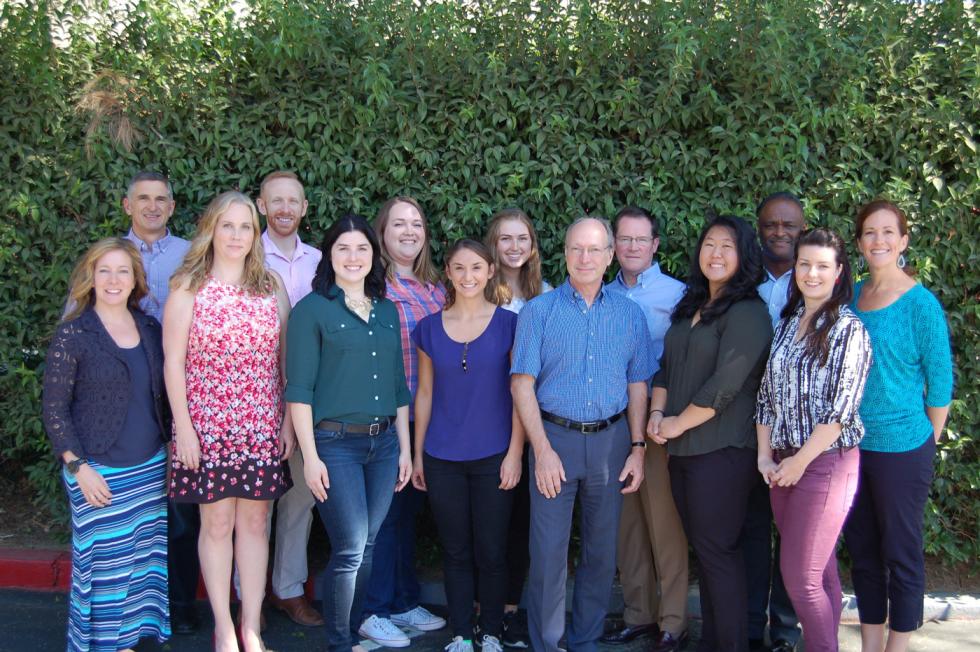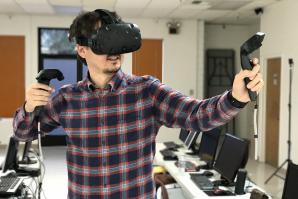Sacramento may not have eBay or Google, but as scientific and high-tech companies gain a foothold in the region, many have discovered that being a smaller city with multiple higher education institutions attracts talent that rivals that of the Bay Area. When it comes to pitching to prospective employees — both locals and out of town recruits — Sacramento’s calm sells over the chaos of other cities.
Sacramento State’s computer science program is one of the oldest and largest in the CSU system with about 900 students. “One of the biggest changes is the blurring of boundaries between computer science, engineering and electrical engineering,” says Lorenzo Smith, dean of the College of Engineering and Computer Science. “It’s more interdisciplinary than ever before,” which reflects the working world students face after graduation.
“Of course companies want employees who have a solid foundation,” Smith says. “But our focus is on applying the science and our students are so well rounded they can grapple in all three fields … If they can’t solve a problem, they can network to find a solution.”
Related: Nevada County incubator builds on region’s video tech legacy
Work projects, sponsored by tech companies such as Intel and Hewlett Packard, also allow computer science and computer engineering students to work with potential employers on real-world challenges. “The projects might be something that the companies don’t have the time to work on, so the students do it,” Smith says, noting that the companies pay for all the course materials.
All seniors are expected to work on a sponsored interdisciplinary project in their field as a practical transition between the classroom and the workplace. “We’re proud of that approach,” Smith says. “We think it meets the needs of local companies and it shows that our students can hit the ground running.”
The projects have to fit within many real world criteria that determine their success, such as cost, packaging, market feasibility and safety. A team of mechanical and electrical engineering students, for example, recently designed a set of steps for a mobile home that fold into a flat-surfaced lift for wheelchairs with the touch of an electric switch.
“We have a close relationship with Sac State and it has been our best source for entry-level hiring … We’ve hired 52 software engineers from Sac State in the last two years.” Chris Mohler, talent acquisition leader, PowerSchool
PowerSchool, a Folsom-based education technology platform that’s focused on better connecting students, teachers and parents, invests significant funds and effort into recruiting from Sac State. By sponsoring internships inside the company, PowerSchool provides students hands-on experience and in return gets a chance to vet potential hires before they hit the job market. Currently the company, which has about 30 interns from the computer sciences, serves approximately 32 million students in 70 countries — and, according to PowerSchool Talent Acquisition Leader Chris Mohler, many of its entry-level employees come from Sac State.
“We have a close relationship with Sac State and it has been our best source for entry-level hiring,” Mohler says, which can include software developers, engineers and software architects. “We’ve hired 52 software engineers from Sac State in the last two years.”
Even as interns, software engineering students at PowerSchool develop mobile apps for IOS/Swift and Android use. Other interns are building databases and online customer education modules.
Evolve BioSystems (team pictured above) was founded by five UC
Davis research faculty and continues to benefit from the talent
pool of university grads.

PowerSchool also sponsors an annual dinner to get acquainted with computer science students and to give them a chance to meet alumni and executives from the company. “Last year, the room was filled with about 40-50 students, plus alumni who work for us and our VP of Development,” says Mohler.
Beyond entry-level hiring, Mohler says the company has also recruited high-level employees from the Sacramento area who have worked at places such as Intel and HP. But he’s also noticed many computer engineers he has hired at senior levels willing to migrate from metropolitan areas such as Seattle, Portland and the Bay Area. “People want to move here for the quality of life,” he says.
Related: Nevada County companies are in desperate need of techies
When it comes to actively recruiting talent to the region, many local companies find themselves competing with the Bay Area. “People who are not originally from here initially think that Davis is part of the Bay Area,” says Tracy Shafizadeh, director of scientific communications at Evolve BioSystems, who has recruited new employees from as far away as Chicago and Connecticut. “When we first talk to them, they may be hesitant to pull out of Chicago and move,” she says. “Once they bring their families here, they realize that the area has a special lifestyle.”
The company, founded by five research faculty from UC Davis, is a spin-off from the university’s Foods for Health Institute and develops products to address gut microbiome problems in newborn children and nursing animals. “We’re at the intersection of microbiology and nutrition,” Shafizadeh explains. She says that the opportunity to work in infant microbiome research is the biggest reason why employees are willing to migrate to Davis. “The university is a wonderful anchor for us,” she says. “It legitimizes the work we do and the level of science we work on.”
The five founders of Evolve BioSystems continue to teach at UC Davis, which is well-known for its programs in agriculture and microbiology. “It gives us an opportunity to talk to students and provides a talent pool,” Shafizadeh says.
As someone who has worked in life sciences in the Sacramento area for 15 years, Shafizadeh says that the biotech health industry in the area has grown, resulting in more jobs for those with a technical background — and UC Davis is not the only source for that talent. “Many of us have been in the business for a long time and have our own network of contacts to find prospective employees,” Shafizadeh says. Recruiters that specialize in the biotech industry, including those in the Bay Area, have taken notice. “They see the passion and dedication we have and they get excited,” she says, to steer good candidates to the company.
Overall, the region’s high-tech industry is small and entrepreneurial-sized compared to the behemoth it is in the Bay Area. Nonetheless, the local talent pool is growing and the region is attracting out-of-town talent as well. “I think the perception of Sacramento is changing,” says Mohler, of PowerSchool. “When we recruit people from out of the area, we encourage them to stay in Historic Folsom or Midtown Sacramento to see how compelling this area is.”
Recommended For You

Reality Check
Virtual reality is no longer just for the gaming industry — but how wise an investment the cutting-edge technology is remains up for debate
From police shootings to incidents like the Fort Lauderdale airport shooting, gun violence has been dominating news cycles in recent years. Additional virtual training could help civilians know how to respond in a hostile encounter.

Local Business Aims to Transform the News
VR media startup in Nevada City plans to build platform to immerse readers
The push to integrate VR into the media has surged in recent years. The Guardian last summer unveiled its first VR project, 6×9, putting viewers into a solitary confinement prison cell. Last fall, The New York Times introduced The Daily 360. These immersive videos, made with Samsung technology, give readers rare glimpses into scenes worldwide.



